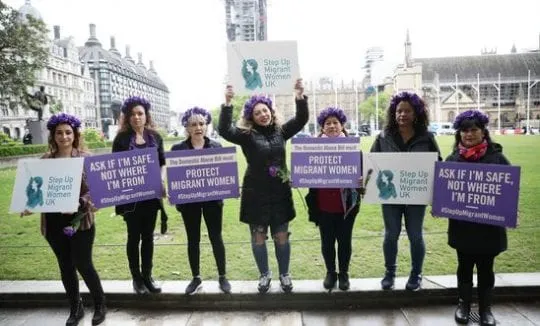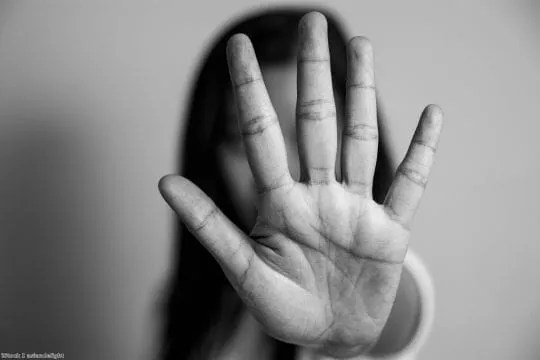Government urged to amend Domestic Abuse Bill to protect migrant victims
The Domestic Abuse Bill is being pushed through the final stages of Parliament today (27 April) with last-minute amendments to be considered before it receives royal assent.
However, without significant reform, the Bill risks turning a blind eye to migrant victims of abuse.
If you have been subjected to domestic abuse and you are worried about your immigration status, the Immigration Advice Service (IAS) is here to help. Our lawyers can speak to you in confidence and can assist you in applying for permanent immigration status under the Domestic Violence (DV) Rule. Ring our customer care team today for immediate support and guidance on +44 (0)333 414 9244.
Read our 1001 reviews
The UK Domestic Abuse Bill
The long-awaited Domestic Abuse (DA) Bill, initially introduced by Theresa May in 2019, promises a swathe of sweeping reforms to the criminal justice system and to the courts. It pledges to protect victims with unprecedented measures, including a statutory definition of abuse that recognises emotional and coercive behaviour, as well as brand new protection orders.
It also promises to put an end to the abhorrent practice which has seen survivors of abuse cross-examined and interrogated by their perpetrator in court.
While victims of domestic abuse can be male or female, women are disproportionately affected by the crime. On average, two women are murdered by the hands of their abuser every week – a figure which rocketed to five during the height of Britain’s Coronavirus lockdown measures.
As such, the legislation has been hailed as a landmark victory towards tackling Violence Against Women and Girls (VAWG). However, campaigners fear that the Bill will only entrench a two-tier system of support in the UK where only women with British citizenship can benefit from the full scope of the Bill while migrants are left to fall through the cracks.

Seeking support as a migrant survivor
For migrant women in particular, domestic abuse is an acute crisis. They are often isolated by the language barrier and kept financially dependent on their perpetrator as a result of their No Recourse to Public Funds (NRPF) condition.
To add to their traumatising ordeal, victims are often threatened with detention and deportation – initially by their abuser but also by the police should they attempt to report it. In the absence of a firewall between the authorities and immigration control, victims who are able to seek support from their local police force find themselves reported instead. Research by King’s College London in 2019 found up to 62% of women with an insecure status were threatened with deportation by their abuser and over half (54%) were warned they could lose their visa. Many refuges and shelters are unable to accommodate migrant victims since beds are provided by public funding, which the state prohibits for those without permanent immigration status as part and parcel of the NRPF rule.
Stifled from financial support, excluded from legal protections and shunned from a safe place to sleep, migrant victims of abuse are therefore increasingly vulnerable to destitution, homelessness and prolonged abuse.

Rejected by the Government
Despite enormous support, the Government has refused to support many of these key amendments.
Instead, a 12-month pilot scheme, ‘Support for Migrants’, has been implemented. Yet MPs and activists alike find the £1.5m fund that is pledged in the scheme to drastically fall short in covering the resources required to prompt key change. They argue that victims would be better supported if the existing provisions were amended.
The danger remains that the Bill will be passed through Parliament today without any of the reforms it needs after a lengthy two-year stint. The Bill has been stalled time and time again having endured a general election, a new government, Brexit and Coronavirus.
You can monitor the status of the Bill as its amendments are considered for the final time here.
How the IAS can help
Here at the Immigration Advice Service, our immigration lawyers are well equipped in assisting survivors of abuse. We honour full confidentiality and handle each case with compassion and sensitivity.
If you wish to speak to an immigration lawyer in private about switching from a Spouse Visa to Indefinite Leave to Remain (ILR), or you need assistance in filling out the DDVC form, our lawyers are on hand to help. We can even represent you at a Tribunal hearing in the event that your application is refused and you wish to appeal.
Speak to our friendly customer care team today on +44 (0)333 414 9244 to hear more about how we can help.
Table of Contents
Table of Contents will appear here.Table of Contents
Table of Contents will appear here.Legal Disclaimer
The information provided is for general informational purposes only and does not constitute legal advice. While we make every effort to ensure accuracy, the law may change, and the information may not reflect the most current legal developments. No warranty is given regarding the accuracy or completeness of the information, and we do not accept liability in such cases. We recommend consulting with a qualified lawyer at Immigration Advice Service before making any decisions based on the content provided.















